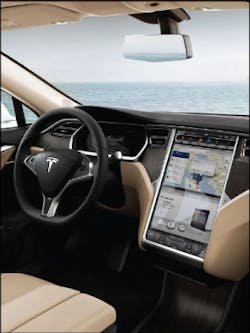Preparing for Automated Vehicles
The technology exists, and they could be on roads sooner than you might think, says Daniel Gage, spokesperson for the Alliance of Automobile Manufacturers (AAM). He’s referring to fully automated vehicles—cars that can drive themselves from point A to B while obeying traffic signals and laws, detecting other vehicles and pedestrians, and maneuvering roads and obstacles with no human interaction.
Several auto manufacturers have made waves in the industry recently with announcements regarding automated vehicle research and development. Both Nissan Motor Co. and Mercedes-Benz have made aggressive public announcements to have fully automated vehicle designs commercially viable by 2020. Tesla Motors hopes to beat them to the punch, and release_notes an autonomous vehicle in 2017. And Volvo is launching a pilot program that will put test vehicles on the road in 2017.
But Gage says automakers have been working on the concept for some time now, and “virtually every other auto manufacturer is also working on an automated vehicle of some sort.” And so are other technology companies like Google, IBM, Nokia and Continental.
Many questions remain to be answered before these cars will become commonplace—including driver requirements, liabilities, standards, insurance policies and law enforcement—which Gage says policy makers within the U.S. have yet to address. But he says the movement will push forward because auto industry experts and policy makers alike believe automated vehicle technology will be a positive step toward minimizing traffic accidents, improving traffic flow, reducing road congestion and improving fuel economy.
It’s a trend that repair shop operators need to pay attention to, Gage says. Cars will be more computerized than ever before, so shops will need technicians who are not only mechanically intelligent, but tech-savvy, too.
That’s because automated vehicles will operate using a combination of several driver-assist features in conjunction with computer software algorithms and programs.
“This is changing the industry,” Gage says. “It’s going to force mechanics to be good auto technicians as well as computer technicians.”
Currently, only 5 percent of consumers would trust aftermarket shops to install self-driving equipment, according to a poll released by the AAM in June 2013. So shops should work to become familiarized with the technology now to proactively build a reputation as an automated vehicle expert.
A Skilled Aftermarket is Needed
Research indicates the prominence of automated vehicles on roadways could gain momentum quickly. Autonomous vehicle sales could grow from 8,000 in 2020 to 95.4 million annually by 2035—a number that represents 75 percent of all light vehicle sales, according to a report from Navigant Research.
Although fully automated vehicles won’t be showing up in your shop tomorrow, it’s never too soon to start preparing your shop for work on that fleet.
“Electronic components wear out. These cars are going to have mechanical and sensor failures,” says Richard Wallace, director of transportation systems analysis for the Center of Automotive Research (CAR). “So somebody needs to be able to go in and replace these various modules.”
Gage says auto manufacturers plan to rely heavily on aftermarket shops to do it.
“We’re going to have huge reliance on aftermarket shops,” Gage says. “There are too many cars on roads and too few dealerships to have people only go to authorized dealerships for repairs.”
Tech-Oriented Training
What that means for shops and technicians nationwide, Gage says, is there will be a need to learn the ins and outs of vehicle computerization. In addition to ongoing training for mechanical-oriented repair processes, technicians will also need to obtain additional sets of electronic training in order to properly diagnose, repair and replace new sets of software, sensor systems and other electronic components.
Gage says this will require constant attention over the next two decades as automated vehicles are more thoroughly developed and enter dealership showrooms.
Gage admits this could create a host of challenges for shops in regards to keeping up to date with the technology, understanding where to acquire information, and knowing what tools are needed to make repairs. Most of those questions remain unanswered, and it’s not yet known whether automated vehicles will spur development of new types of repair certification programs.
But he says every auto manufacturer will be highly committed to make the information available. He expects the industry will see increased usage of online training modules, and manufacturing companies will also work closely with industry associations like the Automotive Service Association (ASA) to disseminate information and training to constituents.
“We don’t want people to buy vehicles and not be able to get them fixed; part of the ownership cycle is ease and affordability of repair,” Gage says.
CAR’s Wallace says the repair industry will also witness changes in training. Secondary and post-secondary automotive schools will start placing significant emphasis on electronics, software and radio communications, and less on powertrain and other mechanical issues.
“Some community colleges are already beginning to develop programs and put such things together,” he says.
Consumer Perception
According to a poll of 2,000 American drivers released by the Alliance of Automobile Manufacturers in June 2013, 59 percent of consumers value new driver assist technologies in automobiles, and want to assess those systems when buying new vehicles.
Still, significant consumer skepticism remains on the idea of fully autonomous vehicles. Only 33 percent of consumers believe fully autonomous vehicles are a good idea, while roughly 42 percent believe they are a bad idea and 24 percent remain undecided.
“Fully autonomous vehicles are probably a generation away. We still have a long way to go before we get consumer acceptance,” Gage says. “We see consumers wanting driver assist features, but they’re reluctant to give up complete control.”
The data below reveals the mindsets consumers have toward automated vehicle designs:
